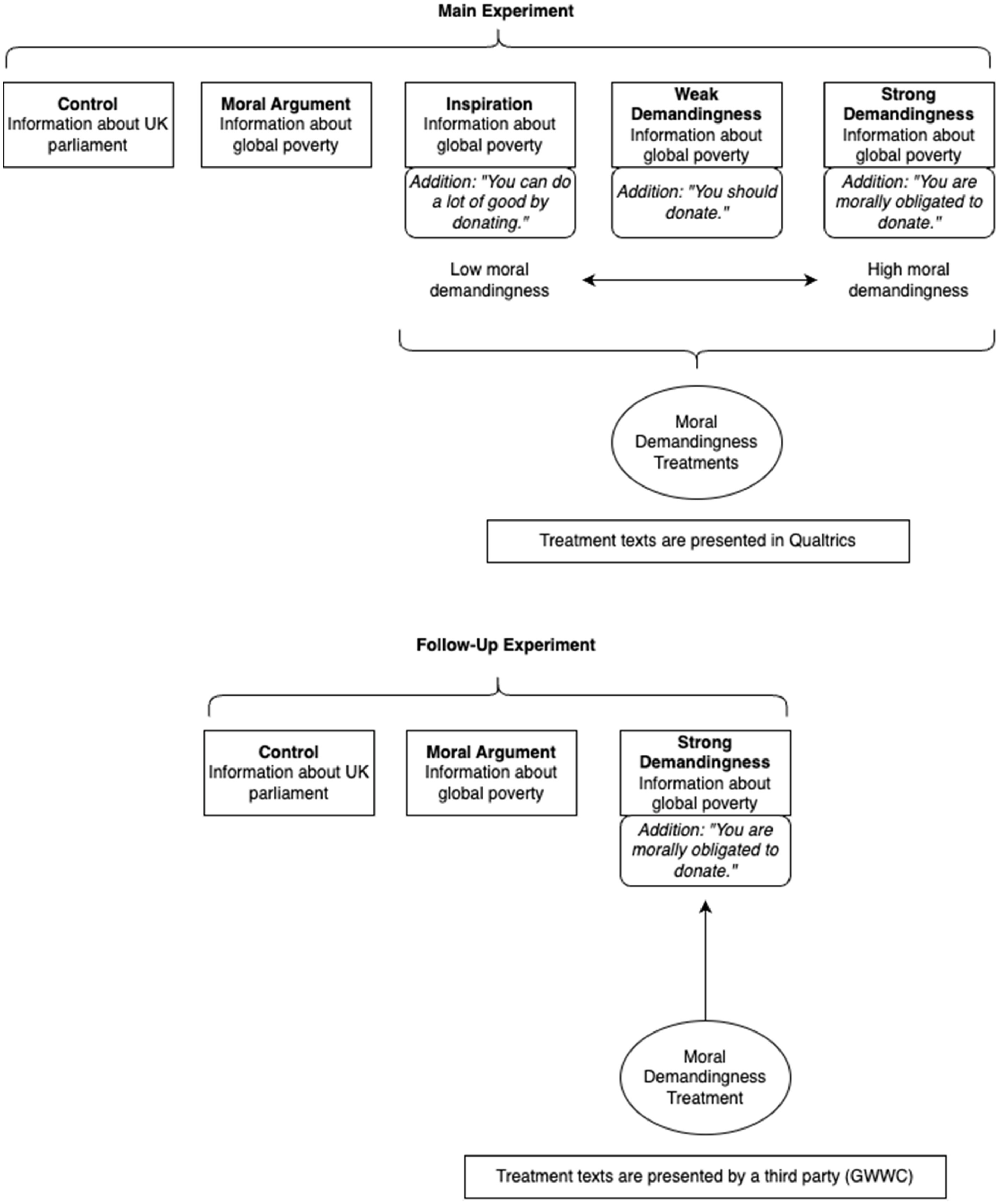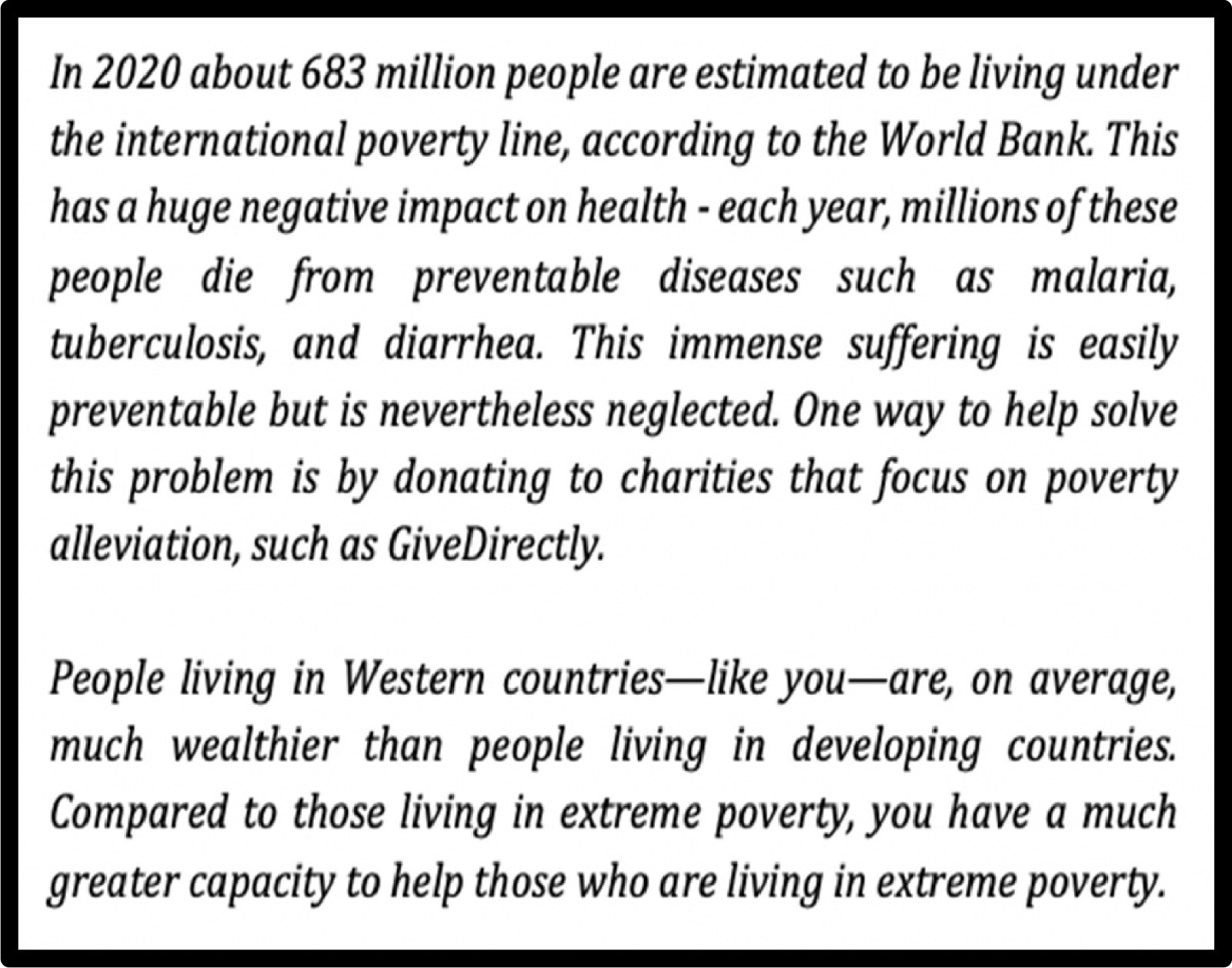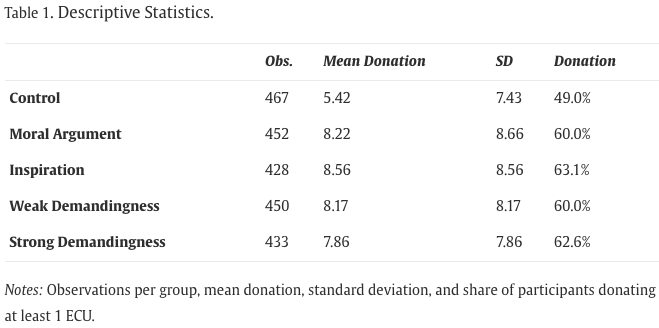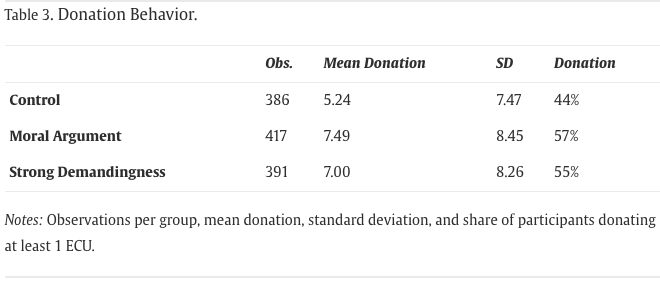SUMMARY
In this post, we summarise a recently published paper of ours that investigates how people respond to moral arguments, and morally demanding statements, such as “You are morally obligated to give to charity” . The paper is forthcoming in the [Journal of Behavioural and Experimental Economics]. (If you want an ungated copy, please get in touch with either Ben or Philipp).
- We ran two pre-registered experiments with a total sample size of n=3700 participants.
- We compared a control treatment to a moral argument treatment, and we also varied the level of moral demandingness to donate after they read the moral argument. We found that the moral argument increased the frequency and amount of donations. However, increasing the levels of moral demandingness did not translate into higher or lower giving.
BACKGROUND
The central motivation for our paper was the worry that many have expressed, including a number of philosophers (e.g., Kagan, 1989; Unger, 1996; De Lazari-Radek and Singer, 2010) that having highly morally demanding solicitations for charitable giving may result in reduced (not increased) donations. This possibility of a backfire effect had been raised many times in a variety of contexts but had not been tested empirically. In our paper, we attempted to do just that in the context of donations to Give Directly.
EXPERIMENT DESIGN

In our first study (n=2500), we had five treatments (control, moral argument, inspiration, weak demandingness, and strong demandingness). In the Control condition, we showed participants unrelated information about some technicalities of UK parliamentary procedure. In the Moral Argument condition, we presented participants with a text about global poverty and the ability of those living in Western countries to help (see figure 2). For the Inspiration, Weak Demandingness, and Strong Demandingness conditions, we used the same text as in the moral argument condition, but added one sentence to each.
Inspiration: For these reasons, you can do a lot of good if you give money to charities-such as GiveDirectly-to alleviate the suffering of people in developing countries at a minimal cost to yourself.
Weak Demandingness: For these reasons, you should give money to charities-such as GiveDirectly-to alleviate the suffering of people in developing countries at a minimal cost to yourself.
Strong Demandingness: For these reasons, you are morally obligated to give money to charities-such as GiveDirectly-to alleviate the suffering of people in developing countries at a minimal cost to yourself.

In this study, we were interested in two comparisons. First, we compared the control and the moral argument conditions to look at the effect of moral arguments on charitable giving. Second, we compared the moral argument with each of the three moral demandingness conditions to investigate whether increasing levels of moral demandingness lead to an increase or reduction in charitable giving.
In our second study (n=1200), we narrow down our research question by looking only at the conditions of control, moral argument, and strong demandingness. We test the same two main questions as in our first study. The key difference is that the Moral Argument (and demandingness) was presented to participants via the Giving What We Can Website (see Figure 3). This was done to mitigate experimenter demand effects, as well as to provide a more natural vehicle for the information to be delivered.
In both studies, after reading the randomly allotted text, participants could choose to donate some, none, or all of their earnings (20 ECUs, where 1 ECU=£0.05) to the charity GiveDirectly.

RESULTS
The main results of experiment 1 & 2 are provided in Figures 4 & 5 respectively.


Result 1a: Across both experiments we found that moral arguments increased how likely people were to donate (11 percentage points more in E1 and 12 percentage points more in E2).
Result 1b: Across both experiments we found that moral arguments increased the total amount of money donated (51.7% more in E1 and 42.9% more in E2).
Result 2: We did not find any evidence that inspiration and weak demandingness affected donation behaviour.
Result 3a: Strong demandingness did not have an effect on donation frequency compared to the Moral argument treatment. Our evidence suggests, that the effect of the Strong Demandingness treatment is either null or smaller than a 10% increase or decrease in the frequency of donation compared to the Moral Argument treatment (and 7.5% for Study 2)
Result 3b: We found some weak evidence that Strong Demandingness results in a smaller amount of donations, conditional on a participant choosing to donate in study 1. However, this does not replicate in Experiment 2.
Data on GWWC Pledges (not in the paper)
At the end of the study, participants read a short description of GWWC, where we varied whether the pledge was 1% or 10% of income. The description was as follows:
“Giving What We Can is an organisation that supports people in their commitment to helping others and learning about effective giving. They aim to create a culture where people are inspired to give more, and give more effectively.
Giving What We Can offers the opportunity to sign a pledge to donate 10% of your income to charity.”
We then asked participants on a 5p point Likert Scale “How likely are you to take this Giving What We Can Pledge at some point in your life?” [1= Very Unlikely 5=Very Likely]
We found that those in the 1% condition (mean 2.47) were significantly more likely to say they would take the pledge than the 10% condition (mean 2.0) Kruskal-Wallis test, p<0.001.
We also provided a link to GWWC if they wanted to learn more. 55 out of 1094 participants clicked the link. In the 1% condition 34/601 clicked the link and 21/593 in the 10% condition (chi-squared test, p=0.081).
LIMITATIONS
There are a number of limitations to this paper worth noting.
- Persistence: We only analysed one donation decision. However, we should care about long term behaviour and whether these effects (or lack of effects) persist in the future.
- Small Stakes: Participants earnings were only £1. While this does have real costs for Prolific participants (average earnings is £6-£10 an hour) it may be the case that their behaviour would differ for larger stakes.
- Moral Argument watered down demandingness: Given the Moral Argument text was two paragraphs, and the moral demandingness text was 2 sentences. It is possible that the Moral Argument captured most of the participants’ attention. It would be interesting to observe how the moral demandingness statements perform with no moral argument.
- Heterogeneity in responses: While on average, morally demanding statements did not affect donation behaviour, it could be the case that it affects different types of people in different ways. For example, in E1 we found some differences between males and females (but this did not replicate in E2). However, there may be other traits we didn’t measure where heterogeneous effects exist.
ACKNOWLEDGEMENTS
We want to thank Philip Grossman, Benjamin Sachs, Zach Freitas-Groff, Theron Pummer, Lata Ganghadaran, Erte Xiao, Brian Jabarian, Kirby Nielsen, David Rhys Bernard, Joshua Miller, Hayden Wilkinson, Tyler John, Miguel Costa-Gomes, Peter Singer, Toby Handfield, David Reinstein and Nina Xue for helpful comments and suggestions. We also want to thank Luke Freeman for his help and support when he had no obligation to do so. This work was supported by a grant from the Forethought Foundation and the Centre for Effective Altruism as well as additional research funding from Giving What We Can.
REFERENCES
De Lazari-Radek, K., Singer, P., 2010. Secrecy in Consequentialism: A Defence of Esoteric Morality. Ratio, 23 (1), 34-58.
Kagan, S., 1989. The Limits of Morality. New York: Oxford University Press.
Unger, P. K., 1996. Living High and Letting Die: Our Illusion of Innocence. Oxford University Press

Very interesting research, thanks for sharing. I feel like you (at least in this post) don't really get to the crux of the matter. The most important question, when deciding whether or not to tell someone that donating is morally obligatory, is whether it is true that donating is morally obligatory. We shouldn't just be optimizing for the most effective methods of rhetorical manipulation.
Thank you for the research.
I do not necessarily disagree with the limitation that the moral argument watered down the demandingness. However, my intuition was that the framing of the "strong demandingness" condition was particularly likely to result in the expected backfire effect.
I think real-life strongly-demanding arguments are much more likely to use the collective "we", acknowledge that this is not socially normal, and acknowledge the incongruence of this obligation with intuitions and psychology. I don't think having this more forgiving/nuanced framing shifts it into a weaker demandingness . I appreciate that the study is also likely better as it is, but I think this is a limitation.
Thanks Scott, that's a really good point.
One of the variables we thought about manipulating was "who is the demand coming from"? The use of language here "I", "We" and other expressions could easily make a difference (social norms are usually presented in terms of "X% of people believe").
Unfortunately, we didn't have the budget to test whether how much of a difference (if any) this made. It would definitely be worth following up on if we were able to get the funding.
This is my intuition as well - the phrasing of the 'strong demandingness' seemed quite jarring compared to the usual language of donation page copy.
Thanks for this research!
Do you suspect that there might be correlations between certain personality traits/values (conscientiousness, discipline, etc) and the convincingness of arguments from moral obligation?
Several people I've met who read The Life You Can Save have told me they were so turned off by the moral obligation arguments that they nearly gave up on it. For me, reading the argument from moral obligation just made the conclusion follow compulsorily.
I was raised as an Orthodox Jew, and others have speculated that being raised within a demanding religious movement where discipline is prioritized might translate to being more receptive to arguments from moral obligation. Of course, I don't know whether or not this is actually true.
Thanks Ariel. That's a great question.
We checked a number of different correlations cross both studies, including altruistic type, how utilitarian they are, guilt, how manipulated they felt, agreeableness, and a number of demographic characteristics including religion.
We didn't find anything in our regression analysis that stood out. However, we reported everything in the appendix, which can be accessed in the paper. Alternatively, I can send it to you.
I guess another question is who is the obligation coming from? In our experiments it was either from us or GWWC. With regards to religion, if it is in scripture or communicated by a religious figure (such as a rabbi or a priest), maybe it holds more weight? Also, the norms regarding giving are different to secular norms.
We didn't measure how convinced they were by the argument (in hindsight we probably should have), but we did ask how obligated they felt and obligations ratings were significantly higher in the Moral Argument treatment than the control. That correlation may be explained by finding the argument more convincing, but we don't have any concrete evidence (from this study) to strongly update our beliefs.
Thanks for posting this.
Just to check my understand - did the participants actually donate their own money? Or were they asked how many frictional units of money they would theoretically donate?
Participants donated their own money. They received a bonus of £1 and could choose how much of it they wanted to keep or donate.
I sort of genuinely think I dislike that title if you aren't going to clearly answer the question.
Should we tell people they are morally obligated to give to charity?
That's very fair! I'm not familiar with the norms for EA Forum title posts. What do you think a better title would be?
I guess something that summarises your research results. But also I genuinely want your expert view on this.
Should we? I guess not, right?
In that case, a better title would probably be something like "Tell people why they should donate, not that they morally obligated to."*
I had a strong prior that telling people they were morally obligated to donate would not have a positive effect and if anything backfire. So I have actually updated a bit in the other direction regarding the backfire effect.
However, given we have evidence that moral demandingness didn't produce any positive outcomes, I would currently tell people not to use them and instead stick to moral arguments (which may even be underused given how effective they are).
In saying that, further research is needed, as there isn't much of a literature at the moment.
*Can I change the title?
You can change the title, though I actually think I was being a bit snotty to pull you up on it.
But you don’t want to imply that the morally demanding argument backfired either. Donations were higher in the morally demanding case, no?
So we should update our beliefs in that direction I think, even if you don’t have statistical power to “rule out” that this difference was due to chance.
Can you tell us: in a simple bayesian updating model what is the ~ posterior probability that the strong moral demandingness condition performed
In experiment 1, condition on them donating they actually donated significantly less in the Moral Demandingness condition (but this didn't replicate in E2).
Can you DM me about the model, I am happy to run that analysis. We ran mean equivalence tests to provide evidence of the bounds of the null result, but I believe what you are suggesting is quite different.
In experiment 1, condition on them donating they actually donated significantly less in the Moral Demandingness condition (but this didn't replicate in E2).
Can you DM me about the model, I am happy to run that analysis. We ran mean equivalence tests to provide evidence of the bounds of the null result, but I believe what you are suggesting is quite different.
'Conditional on positive' results are less reliable because of the potential for differential selection, but that is still a bit interesting. (But it could be e.g., 'bigger push to get people to donate means you attract less interested people on average, so they respond with smaller amounts.)
The equivalence testing is close to what I meant (do you want to expand on/link those), but no, not quite the same.
Quickly, what I had in mind is a 'Bayesian regression'. You input a model, priors over all parameters (perhaps 'weakly informative' priors centered at a 0 effect) and you can then compute the posterior belief for these parameters. R's BRMS package is good for this. Then you can report 'what share of the posterior falls into each of the categories I mentioned below'.
I'll try to follow up on this more specifically, and perhaps share some code.
Thanks David, that would be great! I'll check to see if there is a way to run it on STATA, but if not I can just run it on R.
Hi Ben and Philipp, thanks for sharing your research in the post. I’m interested in how you recruited your study participants?
Thanks Catherine. We just used the platform Prolific for subject recruitment.
Betteridge's law of headlines is an adage that states:
Any headline that ends in a question mark can be answered by the word no.